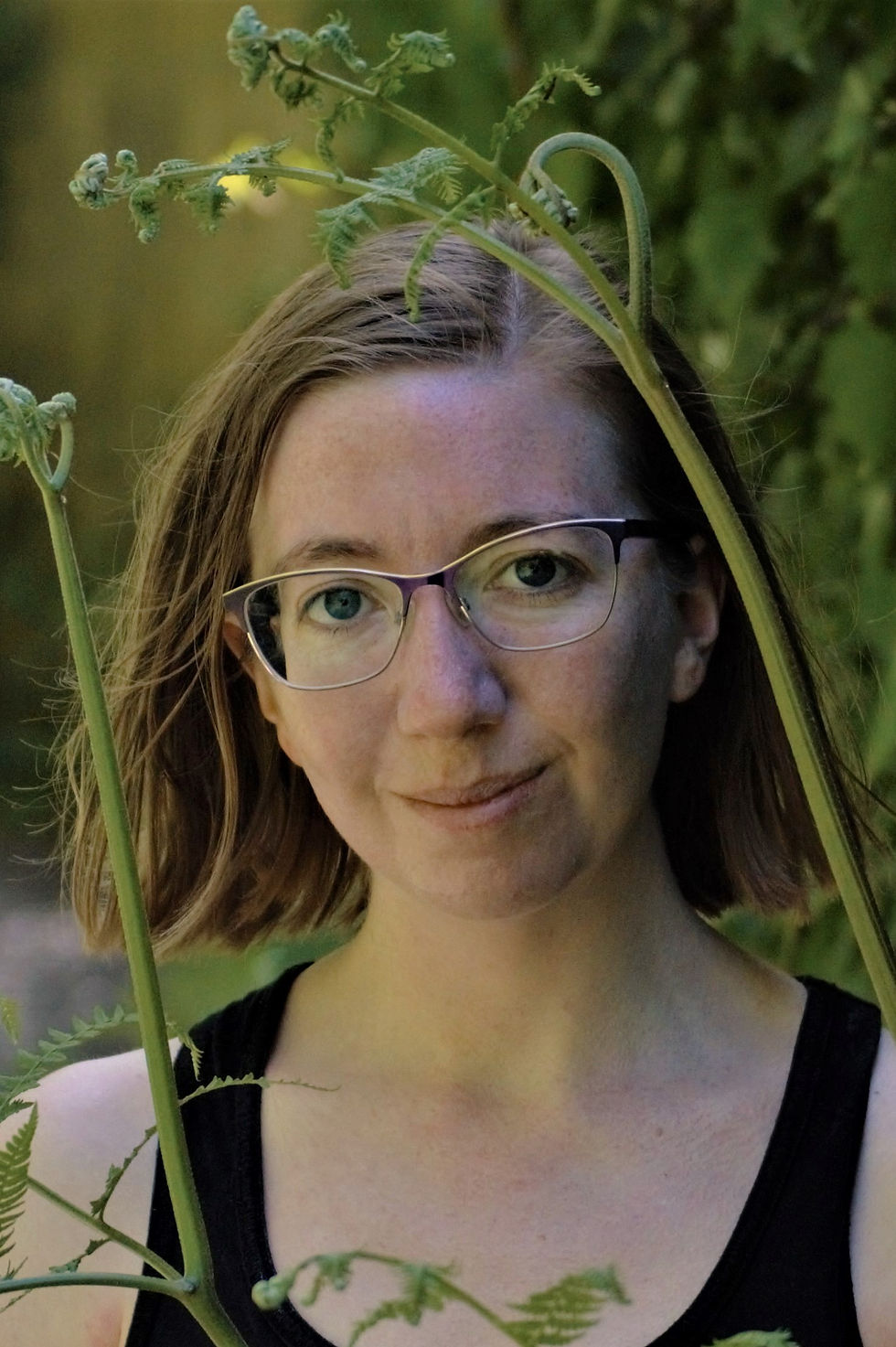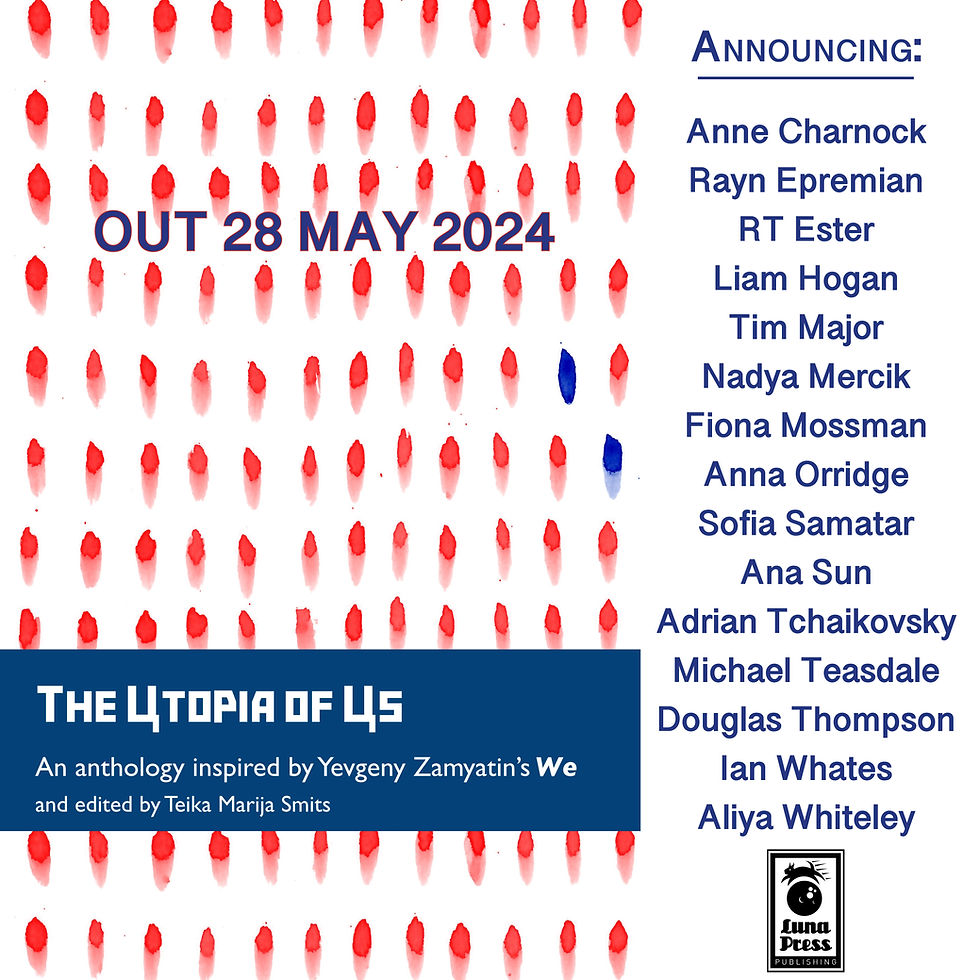
The Utopia of Us anthology is now available for pre-order! Editor Teika Marija Smits has brought together 15 incredible writers and their stories, directly inspired by We by Yevgeny Zamyatin.
It is a charity anthology, and given Russia's current war with Ukraine, royalties from the book will be donated to the Ukraine Humanitarian Appeal.
If you pre-order directly from the Luna website, you will also receive a discount. Check it out!
Today we'd like to introduce you to Fiona Mossman and the story "The Library is Perfect – An Error – Underwater".
About the author:
FIONA MOSSMAN (she/her) is a writer from the Scottish highlands. She is obsessed with short stories, folklore, philosophy and kindness. She has studied literature and book history and works as a librarian in Edinburgh. Her writing can be found in The Bureau Dispatch, Crow & Cross Keys, the Creatives series from the Scottish Mountaineering Press, the anthology We Are All Thieves of Somebody’s Future from Air and Nothingness Press, and elsewhere.
Fiona on the story:
I first read We when I was studying literature at university. I had taken an extra course on Russian literature, which meant that my encounter with Yevgeny Zamyatin’s text included lecture notes on the circumstances of writing and publishing this anti-authoritarian dystopian novel, as well as my usual obsession with the story being told and how it’s being told. This was probably helpful for a sheltered wee Scottish girl, but despite the gap to bridge between my experiences and Zamyatin’s, D-503’s story still spoke to me in a way that was immediate, engaging and thought-provoking.
Returning to the book in order to find inspiration for my story was a welcome return to those days of study and discovery, complete with a mind-map for the themes that I found most compelling: ideas about freedom, crime, perfection, poetics and mathematics, split selves, humans as malfunctioning machines, dreams as pathogens, and throughout it all the desire to complicate and break down the binaries that define and confine us. “Walls are the foundation of anything and everything human” D-503 attempts to argue while despairing about the existence of √-1. He’s greeted by the laughter of R-13, the poet who knows that building a little wall around infinity will not remove the existence of the tormenting irrational. Infinity is an important concept that comes back near the end of the book when I-330 challenges D-503 to tell her the “final number”, demonstrating that just as numbers are infinite, so too are revolutions.
This idea was taken up by another writer who has been a huge influence on me. Ursula Le Guin considered We to be “the best single work of science fiction yet written”, and her book The Dispossessed – one of my favourites – is in no small part inspired by Zamyatin. Here the revolution is ongoing, always under construction, and walls and boundaries move between inner and outer worlds, real and symbolic. Both of these books weave together scientific or mathematical concepts with their philosophical and social implications and their emotional weight for the protagonists in a way that, to me, shows the best of what science fiction can do. My own dystopia of an endless enclosed library takes inspiration from both of these works as well as Jorge Luis Borges’ ‘Library of Babel’ and Susanna Clarke’s Piranesi. Control over what stories get told and what knowledge we have access to is one of the ways in which power is exerted. The symbolism of the library (more often seen as utopian, but capable of both) is ready to lend itself to these concerns, where classifications embody worldviews, organisation becomes dogma, and the place of a book on a shelf maps to the place of a person in their social group. Zamyatin finishes We with a renewal of the totalising wall, and Le Guin lets Shevek conclude that he will work to “unbuild walls” and let in the draught. Walls, definitions, singular selves and singular shelves might be what we know for now, but knowledge and imagination are both also infinite.

More on the anthology:
The year 2024 marks the centenary of the first publication of We, the direct inspiration for George Orwell’s 1984, and many other novels, such as Ursula K. Le Guin’s The Dispossessed and Kurt Vonnegut’s Player Piano.
Strikingly, the Russian novel was first published in English, and in the US. Indeed, it wasn’t until 1988 that it was published in the author’s native country. Clearly, this was a book that the people in power in the Soviet Union wanted erased. Yet it ushered in a new genre – the future dystopia – and in doing so gave birth to the many dystopian novels and films which have found their way into our popular culture.
Setting aside what its publication history says about Russia’s past, it also happens to be a beautifully written and page-turning novel, and one that is still currently relevant since it speaks to the very heart of what it means to be human. In short, the centenary of this wonderful novel should be, and needs to be, celebrated, and how better to do that than by a globally minded, independent press, publishing an anthology of science fiction stories inspired by We?

Comments